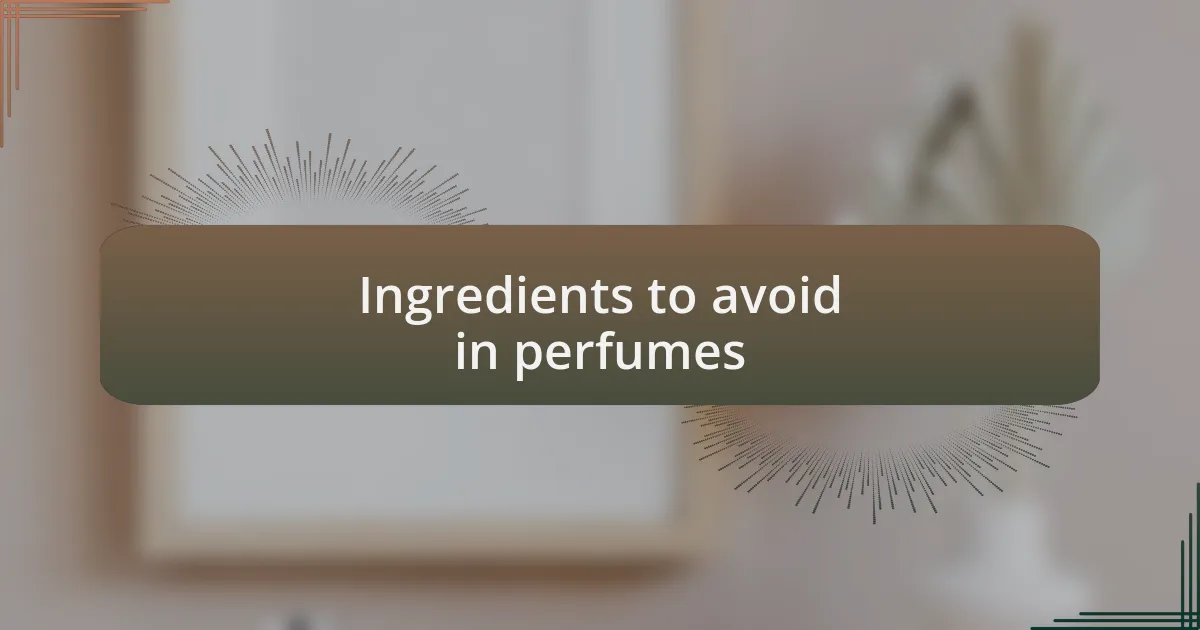Key takeaways:
- Sensitive skin products are designed to be gentle, often labeled “hypoallergenic” and “fragrance-free,” but individual responses to ingredients can vary.
- Avoid synthetic fragrances and denatured alcohol in perfumes as they can irritate sensitive skin; even natural ingredients can trigger reactions.
- Testing perfumes on a small area and using fragrance-free moisturizers can help manage the risk of irritation.
- Choosing light, natural, or oil-based fragrances tends to be safer for sensitive skin, as they are often less irritating.

Understanding sensitive skin products
Sensitive skin products are specifically formulated to be gentle, avoiding harsh chemicals and irritants that can provoke reactions. When I first started exploring this category, I was surprised to find that the labels often highlighted terms like “hypoallergenic” and “fragrance-free.” These designations made me feel hopeful, knowing that as someone with sensitive skin, I was taking a step in the right direction.
I remember the first time I used a sensitive skin moisturizer—my skin felt like it could finally breathe. That sensation was both liberating and relieving. Have you ever felt your skin just tingle with approval? It’s a powerful reminder that the right products can make a huge difference in our daily comfort.
Digging deeper into sensitive skin products, I realized that understanding your own skin’s quirks is crucial. Not all sensitive skin is the same, and what works for me might not work for you. For example, some products enriched with soothing ingredients like aloe vera or chamomile can work wonders for redness, but certain extracts might also trigger a flare-up in others. It’s this intricate balance that makes finding the right product an exciting yet challenging journey.

Ingredients to avoid in perfumes
When it comes to choosing perfumes, there are certain ingredients I’ve learned to steer clear of, especially for my sensitive skin. For instance, synthetic fragrances often contain a cocktail of chemicals that can lead to irritation. I can’t tell you how many times I was lured in by a beautifully packaged perfume, only for my skin to rebel hours later. It’s frustrating, isn’t it, when something so enticing morphs into a source of discomfort?
Another red flag for me has been alcohol, particularly denatured alcohol. While it’s common in many fragrances as a solvent, it can strip moisture from the skin, leaving it dry and irritated. I remember a phase when I experimented with a trendy fragrance that promised long-lasting wear, yet all I felt was the tightness in my skin screaming for hydration. Have you ever had that experience where a scent turns into a nightmare?
Finally, botanical extracts might seem harmless, but I’ve discovered that some can be irritating as well, particularly ones like citrus or certain spices. For example, I once tried a perfume infused with a popular floral note, but it left my skin red and irritated. It’s a gentle reminder that even “natural” ingredients can pose risks, so knowing what triggers your own sensitivity is crucial in making the right choices. Do you keep a list of fragrance notes that work for you?

Testing perfumes for sensitivity
Testing a new perfume for sensitivity is always a bit of a leap of faith for me. I remember the first time I tried a sample of a fragrance I was excited about. I applied just a small amount on my wrist and walked around for a few hours, checking in with my skin periodically. It’s amazing how something that smells divine can turn into a nightmare if irritation strikes. Have you ever taken that risk?
Another strategy I’ve found helpful is the patch test. Instead of immediately spritzing a new scent all over, I like to apply a bit behind my ear or on the inside of my elbow. This way, I can observe how my skin reacts without going overboard. One time, I used this method on a highly recommended scent and was relieved to find that it was completely skin-friendly. Learning to take precautionary steps like this really gives me a sense of control. How about you—do you test scents before committing?
Lastly, fragrance-free moisturizers can be my best friends when testing new perfumes. They provide a protective barrier on my skin, minimizing the chance of an unwanted reaction. There was a time when I forgot this step and paid the price with itchy, red skin after trying a new perfume. Now, I never skip it. I believe that being proactive rather than reactive makes a world of difference. What techniques do you use to protect your sensitive skin when trying new scents?

My personal experience with fragrances
There was a time when I was naive about how fragrances could affect my sensitive skin. I vividly recall attending a wedding, where I spritzed on a bold scent that I thought would enhance my outfit. Instead, I ended up feeling self-conscious as I noticed my skin turning red and itching. It’s scary how quickly joy can turn to discomfort—can you relate to that feeling?
When I fell in love with a particular fragrance, I embarked on a journey to test it with a sense of caution and excitement. I remember wearing it on a day when I felt confident, but I was also hyper-aware of my skin’s reactions. Every time I caught a whiff of that scent, a part of me wondered whether I would face irritation later. It’s that emotional tug-of-war that heightens the experience of fragrance for me—do you ever find yourself in that kind of quandary?
I’ve learned that certain notes in fragrances can be more suitable for my skin than others. For instance, I’ve had great luck with citrus-based scents; they seem to be refreshing without triggering any irritation. There was this one time I picked up a lemon verbena perfume, and it felt like a breath of fresh air, allowing me to express my personality without apprehension. Isn’t it wonderful to find that perfect harmony between scent and skin?

Tips for managing sensitive skin
When managing sensitive skin, I’ve found that less is often more. A few months ago, I decided to simplify my skincare routine by cutting out unnecessary products. The relief I felt when my skin reacted better was incredible. Have you ever tried stripping your routine down to just the essentials?
Choosing the right materials for application is another critical aspect. I remember switching to a soft, cotton pad instead of those harsh synthetic ones. That simple change made applying my fragrance feel more like a gentle caress than an irritating swipe. It’s amazing how the tools we use can impact our skin’s happiness.
Paying attention to the environment around me has also been beneficial. I once spritzed my favorite perfume in a heavily scented room, only to find my skin reacting unfavorably. I now make it a point to apply fragrance in a well-ventilated space, ensuring that I can enjoy the scent without worrying about a potential flare-up. Have you noticed how your surroundings influence your skin’s response?

Recommended perfumes for sensitive skin
When it comes to perfumes for sensitive skin, I always recommend looking for those labeled ‘hypoallergenic’ or ‘fragrance-free.’ I recall a time when I was introduced to a natural oil-based fragrance that changed everything for me. The subtle scent not only felt gentle on my skin but also lingered beautifully without any harsh chemicals. Have you ever experienced a fragrance that felt like it was made just for you?
Another option I swear by is light floral fragrances, like lavender or chamomile. I remember trying a lavender perfume once—it was like a calming hug for my senses. The delicate aroma enveloped me without overwhelming my skin, making it perfect for all-day wear. Have you found a scent that washes over you with tranquility rather than irritation?
For those who prefer something a bit bolder, consider choosing perfumes with fewer synthetic notes. I once discovered a sandalwood fragrance that resonated deeply with my skin’s chemistry, creating a warm and inviting scent that didn’t disturb my sensitivity. It’s amazing how the right blend can make you feel confident while keeping your skin happy. Have you explored how different notes interact with your skin’s natural oils?